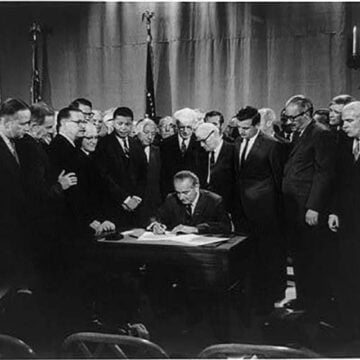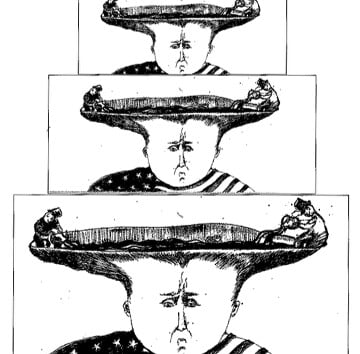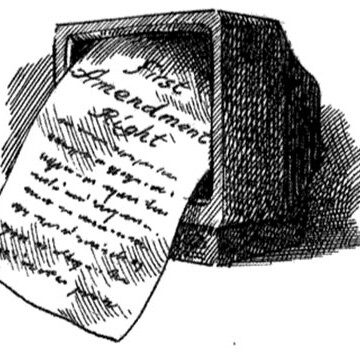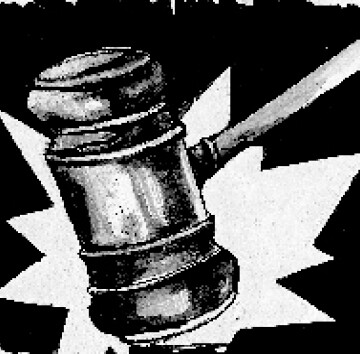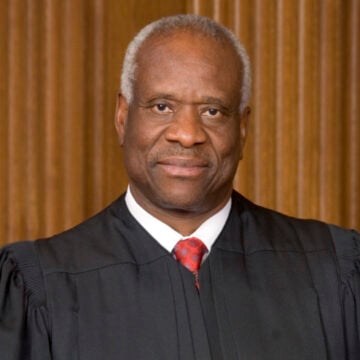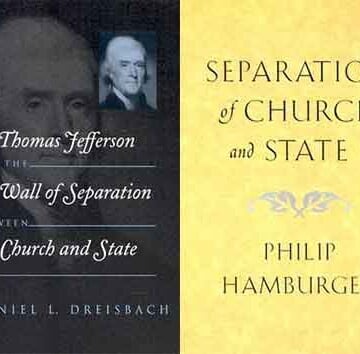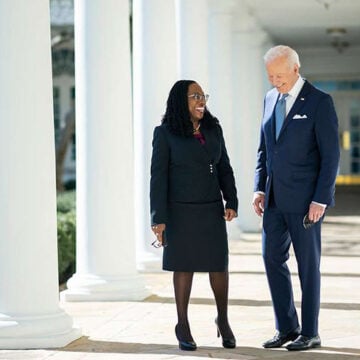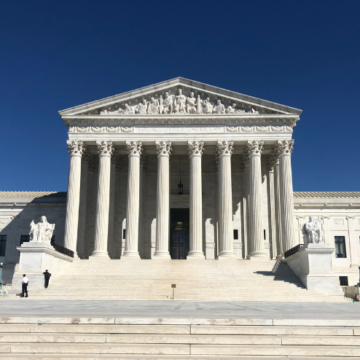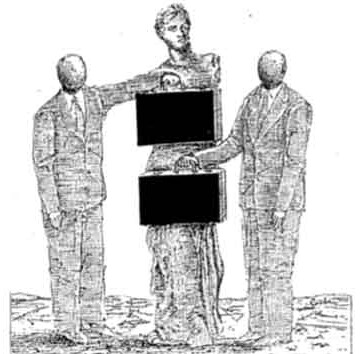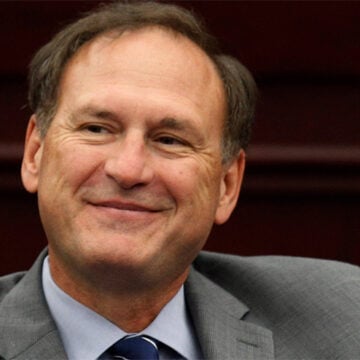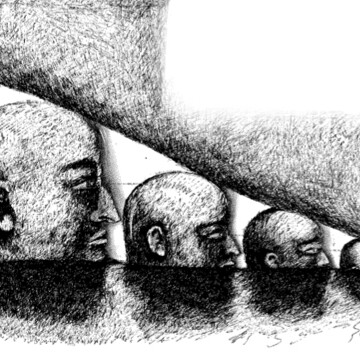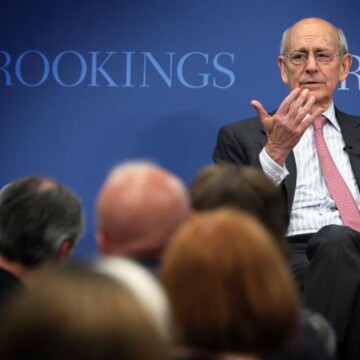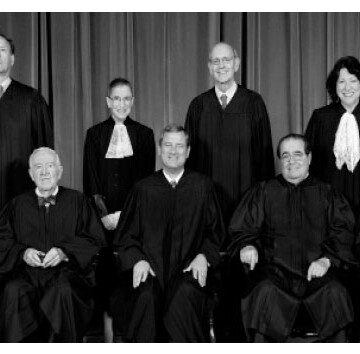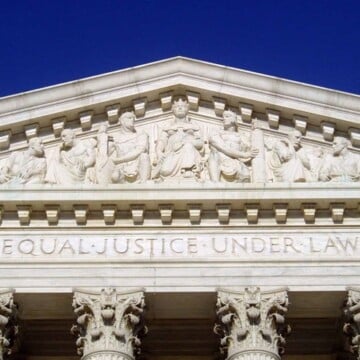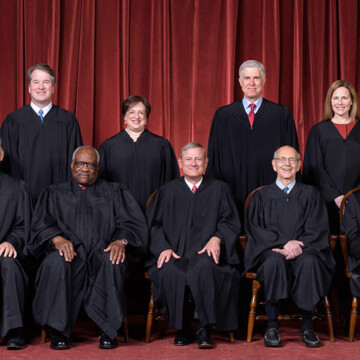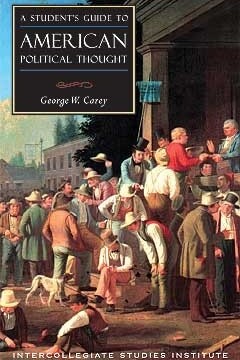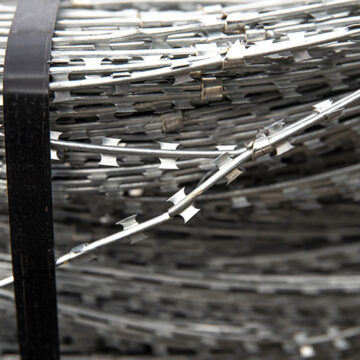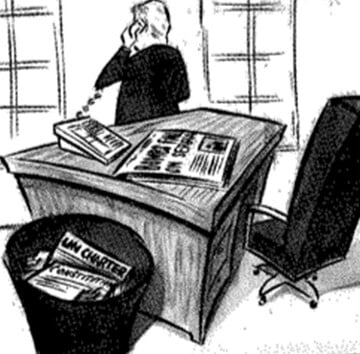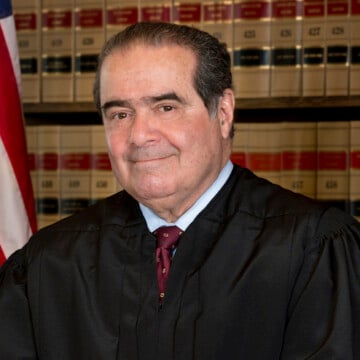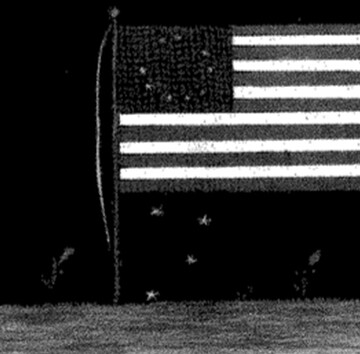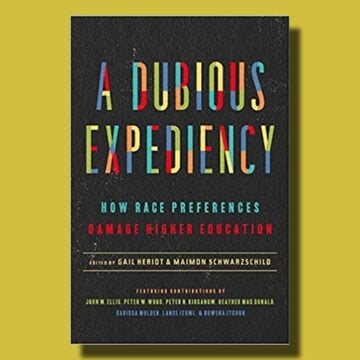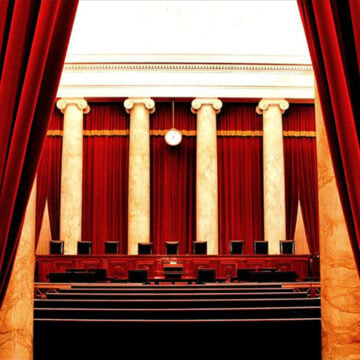Making America great again will require making civil rights honest again.
2065 search results for: Supreme%25252525252525252525252525252525252525252525252525252525252BCourt
The Impotent American Voter
Our great-great-grandfathers, if they were American voters, enjoyed greater opportunity to change policy with their votes than we do today. It is a paradox that as the number of Americans permitted to vote has increased over the past century, the power of those votes has diminished. Many legislators and judges, in their hearts, do not...
American Citizens or Tribal Members of Sovereign Nations?
American Indians compose a nation within a nation. They enjoy American rights and privileges, but also tribal rights and privileges.
Guantanamo Supreme
Do suspected Al Qaeda terrorists captured in Afghanistan and taken to the U.S.-operated prison at our naval base at Guantanamo Bay, Cuba, have a right guaranteed by the U.S. Constitution to contest their detention in the U.S. civilian courts? According to five members of the U.S. Supreme Court, who agreed with an opinion by Justice...
The Last Word
What would the country be like if Congress added to every law it passed a section that said “No court of the United States or any state shall have power to review or interpret this act”? Such a proviso, popularly known as a “stripper,” prevents the Supreme Court from declaring the act unconstitutional. In the...
Federalizing Tort Reform
On May 20, 1996, the United States Supreme Court engaged in its own version of tort reform by striking down the punitive damages award of two million dollars in the BMW of North America v. Gore case. Unfortunately, this case represents an example of two of the worst trends in public policy: expansion of the...
Commercial Speech and the First Amendment
For sheer incoherence, incomprehensibility, and outrageousness, nothing beats the United States Supreme Court’s First Amendment jurisprudence. The First Amendment is a fairly simple piece of constitutional law: It forbids the federal legislature from restricting freedom of speech, freedom of the press, freedom of religion, or from establishing a national religious sect. Unfortunately, in the 20th...
It Ain’t Over ‘Til It’s Over
October 26, 2000, dawned pretty much like every other day here in Rockford, Illinois. After ten years of living under the dictatorship of a federal magistrate, we had decided that nothing would ever change. And then something did. On that glorious Indian summer morning, the Illinois Supreme Court, by a vote of six to one,...
Raiching the Constitution Over the Coals
The Supreme Court is often described as the final redoubt of states’ rights. In the last decade, we have heard much about the Court’s “New Federalism” jurisprudence. The Court, we have been warned, is seeking to return the Constitution to the horse-and-buggy days of yesteryear. Legal oracles such as the New York Times’ Linda Greenhouse...
Crying “Halt!”
A federal judge whom I know lamented that the Supreme Court term that ended last June was the worst in recent memory. That judge loves the Constitution but could find few signs that this term’s key decisions were based on that document. A Court that can rule that medical marijuana grown for home use substantially...
Who’s In Charge of Clarence Thomas?
Liberals have never forgiven Clarence Thomas for refusing their patronage and their leash. As a Supreme Court Justice, he remains an unconquered American.
Robbing Peter, Paying Wal-Mart
When Americans debate the merits of Wal-Mart, the discussions often become contentious, centering on whether this megaretailer is a corporate predator that drives wages down and Main Street businesses into ruin or is a corporate good guy because it offers decent jobs to the jobless and low prices to consumers. Whatever one’s opinion of Wal-Mart,...
Metaphors Have Consequences
“The adulterous connection of church and state.” —Thomas Paine Is “separation of Church and State” a bedrock principle of the U.S. Constitution? Should it be? The answers of constitutional historians Daniel L. Dreisbach and Philip Hamburger fly in the face of conventional wisdom, embodied in such cases as Santa Fe Independent School District v. Doe...
Joe Biden, 20 Years Ago, Blocked the Potential First Black Female on the Supreme Court
Joe Biden repeatedly blocked the path of Janice Rogers Brown when she was being considered for the Court.
Considering Judge Barrett
In one of the most important acts of his Presidency, on Sept. 26, 2020, Donald J. Trump announced his pick to fill the United States Supreme Court vacancy created by the death of Ruth Bader Ginsburg: Amy Coney Barrett. The Supreme Court has recently been divided 4-4 in terms of judicial philosophy, with Justices Ginsburg, Stephen...
Gay Marriage, Before the Ruling
Justice [Antonin] Scalia: [W]hen did it become unconstitutional to exclude homosexual couples from marriage? 1791? 1868, when the Fourteenth Amendment was adopted? . . . Has it always been unconstitutional? . . . You say it is now unconstitutional. [Theodore Olson, attorney arguing that Proposition 8 is unconstitutional]: Yes. Justice Scalia: Was it always unconstitutional?...
Democrats’ Assault on ‘Our Democracy’
The Left's crocodile tears about the fate of "our democracy" can be easily explained by the fact that when Democrats and left-wing activists speak of "democracy," they really mean "progressivism."
Yahoo Justice
The Supreme Court that has recently issued its anti-harassment decision sits in the middle of a city under siege. Justices who have pronounced the nation’s employers liable for “permitting a hostile environment” to exist in the workplace cannot walk within two blocks of the Supreme Court building without being confronted with the most hostile of...
The Supreme Court Leaks Common Sense: Justice Alito’s Splendid Opinion
If Justice Alito’s mysteriously leaked draft opinion on the Dobbs case becomes official, it will overrule a whole line of dubiously reasoned federal abortion cases and will be the greatest victory for sensible jurisprudence in at least five decades.
The Coming Slap in the Face
In June 2005, the U.S. Supreme Court handed down its decision in Kelo v. City of New London, depriving property owners of rights that virtually everyone has always assumed they had. Very soon—before you can say “sequel to Lawrence v. Texas”—the Supreme Court will no doubt take up the issue of same-sex marriage. You think...
What the Founders Didn’t Count On
“I assert that the people of the United States . . . have sufficient patriotism and intelligence to sit in judgment on every question which has arisen or which will arise no matter how long our government will endure.” —William Jennings Bryan As citizens it is fitting that we engage in acts of civic piety...
Politicians in Robes Destroy the Court
Supreme Court Justice Stephen Breyer’s recent rejection of packing the Supreme Court is another welcome addition to the debate, muted in recent months, of whether additional seats should be added to America’s highest court in order to dilute the power of its conservative majority. It also appears to have jogged President Biden’s memory of the...
The Worst Decision
Law professors like to debate among themselves which of the U.S. Supreme Court’s many opinions is the very worst. There has been a general consensus that the most loathsome is the one in Dred Scott v. Sandford (1857), in which the Court decided that the right to hold slaves in the territories was a “fundamental...
On Strippers
I concur with William J. Quirk in his discussion of the jurisdiction of federal courts (Cultural Revolutions, January). However, he missed a related strategic point. In truth, the judiciary is no “final arbiter” of what the Constitution means. If it were, one branch of government would be supreme rather than coequal. So-called judicial supremacy is...
After Obergefell: What Now?
I have previously suggested in these pages that the Supreme Court’s recent decision in Obergefell v. Hodges—the five-to-four decision which declared that two Americans of the same sex have a constitutionally guaranteed right to marry each other—may be the worst in the history of the Court. First, there was no adequate legal or constitutional basis...
How the Fourteenth Amendment Repealed the Constitution
“It is easier to make certain things legal than to make them legitimate.” —Chomfort The evisceration of the federal system by the Supreme Court during the last few decades—indeed, most of the modem malfeasance of that august body—has been accomplished largely through the instrumentality of the Fourteenth Amendment. This sorry tale, from the adoption of...
Appointing Supreme Court Justices
Michael McConnell, to use the overworked metaphor, is the “poster boy” for the Senate Democrats’ attempts to frustrate President Bush’s promise to appoint more Supreme Court justices like Antonin Scalia and Clarence Thomas. Scalia and Thomas are the two current justices who have most closely embraced a jurisprudence faithful to the understanding of the Framers,...
Put Not Your Faith in Judges
Are there Bush judges and Obama judges? “No!” said the Chief Justice of the United States Supreme Court, John Roberts. Judges, he explained during his Senate confirmation hearings, are simply umpires, objectively attempting to follow the rules and call balls and strikes. The chief, let us say, was not being candid. Since 1881, when Oliver Wendell...
Legal Hysteria Spreads as the Court Revisits Roe
It is hard to keep a straight face while reading the hysteria over the United States Supreme Court agreeing to hear Dobson v. Jackson Women’s Health Organization, the Mississippi case challenging the state statute prohibiting nearly all abortions after the 15th week of pregnancy. For those in the legal establishment, the greatest fear seems to be that this...
Dodging A Bullet
The U.S. Supreme Court, late in January, dodged a bullet by refusing to decide whether Maryland’s decision to close its public schools on Good Friday violated the First Amendment’s Establishment Clause. State and local Good Friday closing laws have been with us for many generations, but recently they have been challenged in the federal courts....
Alabama Supreme Court’s Embryo Ruling Embodies America’s Legal Heritage
Many on the left have denounced the Alabama Supreme Court’s ruling in a fertility clinic case as an imperious act of “theocracy” or “Christian nationalism.” Nothing could be further from the truth.
Getting Off the Docket
Is President Bush kidding his conservative base on the “gay marriage” issue? There is no question, if we stay on the road we are on, that the Supreme Court will decide whether Massachusetts can impose its law on the other states. In outlawing Texas’ antisodomy law last June, the Court found that homosexuals are “free...
Taking God Out of School
The Pledge of Allegiance, as this issue goes to press, is illegal for children in the public schools of Alaska, Arizona, California, Hawaii, Idaho, Montana, Nevada, Oregon, and Washington state to recite, because it contains the words “under God.” Two out of three judges on a panel of the U.S. Court of Appeals for the...
The Road to Ideology
Americans have never been big on “political theory.” In our nation’s early decades—and arguably, up to World War II—folks were comfortable with their republican form of government and its tenets of self-reliance and self-government. However, over the past 50 years, political thought—specifically concerning what the U.S. Constitution actually means—has undergone a radical transformation. During that...
Texas Is Correct to Defend Its Sovereignty from the Border Invasion
The mass invasion now transpiring at the U.S. southern border is illegal, immoral, and unsustainable. Texas is within its rights to resist it.
Marbury v. Madison
The impact of judicial review has been profound and often detrimental to the rule of law in America. Judicial review is the power of the courts to void federal, state, and local laws and ordinances that they have determined to be incompatible with the U.S. Constitution. Certainly, national and state legislatures have passed laws that...
Donald Trump, the Court, and the Law
Is Donald Trump a Burkean? Would Russell Kirk vote for him for president? Can a paleoconservative legal scholar imagine any benefit to a Trump presidency? Of course, the neoconservatives are piling on Trump. Most notable was National Review’s January 21 issue, “Against Trump.” “Trump,” say the editors, “is a philosophically unmoored political opportunist who would...
The Living Constitution and the Death of Sovereignty
As this is written, the United States and its NATO allies are bombing the Serbian forces of Slobodan Milosevic. This is the first offensive action for NATO, and the first time that jellied armed forces have been unleashed against a sovereign nation with which the United States is not formally at war without an express...
Birthright Citizenship
The Romans took citizenship very seriously. Only citizens had the right to vote, marry, make legal contracts, and have a trial and appeal the decision of the lower court. Americans, on the other hand, are in the process of getting rid of the concept of citizenship altogether. We are not controlling the border or making...
Judicial Tyranny: An American Tradition
The fiftieth anniversary of the Brown v. Board of Education generated several articles in Chronicles outlining the noxious legacy of that dubious decision. But there were hundreds (if not thousands!) of other decisions by the judiciary that misinterpreted the Constitution, disregarded millennia of Western traditions and laws, and spat in the face of American voters....
Faux Originalism
Is Antonin Scalia’s originalism—indeed, constitutional self-government itself—passé? The eternal temptation to read one’s own values into the Constitution beguiles even religious conservatives espousing natural law. The U.S. Constitution is the “supreme law of the land,” whose ultimate interpretation is entrusted, by longstanding custom if not by explicit textual direction, to the U.S. Supreme Court. Accordingly,...
One Nation Divisible
Something extraordinary has happened over the last decade or so—something neither the Republican nor Democratic leadership seems to understand. A large and growing number of Americans are now openly saying that much of what the central government does is not simply wasteful, corrupt, and destructive but illegitimate as well. This year the central government will...
Bork v. Bork
Two of the most vilified judges in US history have probably been Judge Robert H. Bork and Chief Justice Roger Taney. Both gained notoriety early in their appointments by demonstrating their willingness to fire opponents of a domineering President’s policy (Taney, when in the Jackson administration, fired directors of the Bank of the United States...
How Republican Supreme Court Justices Gave Us Affirmative Action
A Dubious Expediency: How Race Preferences Damage Higher Education ed. by Gail Heriot and Maimon Schwarzchild Encounter Books 336 pp., $28.99 Scholars increasingly treat the issue of race with kid gloves. As the cancel culture accelerates, race—always a sensitive topic—has become nearly taboo. Any serious exploration of the correlation of intelligence and race is...
Arbitrary Nature of the Supreme Court
Pro-abortion and pro-centralization forces have won another victory in the battle over partial-birth abortion. As I detailed in this space last month, a three judge panel of the Seventh Circuit Court of Appeals, breaking with other federal courts, upheld Wisconsin’s and Illinois’ laws against the procedure in October 1999. Planned Parenthood, the misnamed Hope Clinic...
Voucher Plan
School vouchers violate the First Amendment of the Constitution—or so ruled federal District Judge Solomon Oliver, Jr., in early December. Cleveland’s voucher plan, authorized under state legislation, was nondenominational and permitted students, selected by lot, to choose a school participating in the program and to receive a grant from the state to subsidize the cost...
A Hard Case
Terri Shiavo’s tragic struggle is a hard case, and hard cases, we are taught, make bad law. Her husband, Michael, believes she is in a permanent vegetative state and that she would not have wanted to be kept alive artificially. Her parents, however, believe that she stands a chance of recovery and, further, that, as...
Supreme Subjectivism and Arbitrary Abortion
A half-century ago, in Cooper v. Aaron (1958), the Supreme Court referred to the “basic principle that the federal judiciary is supreme in the exposition of the law of the Constitution” as “settled doctrine” and “a permanent and indispensable feature of our constitutional system.” If the Founding Fathers were rolling in their graves in 1958, they...
A Closely Watched Term
The Supreme Court’s closely watched October 1999 term came to an end on June 28, and its themes finally became clear: inconsistency, incoherence, and arbitrariness. On that last day, the Court released important decisions on abortion, aid to religious schools, and homosexual rights, and refused to intervene in the Elian Gonzalez case. The Supreme Court’s...
The Great Left-Wing Disinformation Operation Against the Supreme Court
A coordinated left-wing media smear campaign against conservative Supreme Court justices has one goal and one goal only: to delegitimize the U.S. Supreme Court, and to pave the way for ruinous policies that would irreparably damage, and ultimately destroy, that venerable institution.
